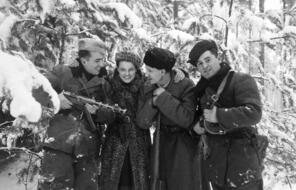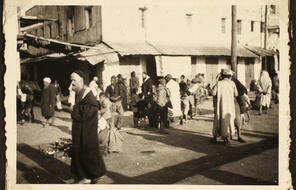Sara Fortis’s Biography
At a Glance
Language
English — USSubject
- History
- The Holocaust
- Resistance
Born in Chalkis, a small town near Athens, Greece, Sara Fortis never knew her father, who passed away when she was only two months old. Raised by her mother, Sara and her sister enjoyed a happy childhood. Though they identified as Greek, they carried on Jewish tradition by lighting candles on the sabbath and attending religious services on holidays.
When the Nazis came to her hometown in 1941, Sara knew it was time to leave. She had heard about Jews in other small Greek towns being deported by the Nazis and never returning. After fleeing with her mother, they settled in the small village of Kuturla. When it was no longer safe, Sara was told that she needed to find a new place to hide, although the villagers agreed to continue to protect her mother.
While looking for a new place to stay, Sara was offered the opportunity to join the resistance and become an andarte (guerilla resistance fighter). She agreed, but with conditions. Wanting to play a significant role in the group, Sara insisted that she be allowed to recruit other women who wished to fight and form their own unit.
Sara’s band of female partisans soon became indispensable. However, fears about the unit’s well-being were not confined to their fighting; in between assignments, the women were often forced to sleep next to the men, and Sara always worried about their safety.
On their first mission, Sara’s unit was ordered to throw Molotov cocktails to distract the enemy and allow the partisans to attack. Impressed by their skills, the male partisans invited the all-female group to join them on future assignments. As the war continued, Sara’s all-female partisan unit burned down houses, executed Nazi collaborators, and aided the men in a way no group of women partisans had before.
Despite their accomplishments, sexism prevented Sara’s unit from getting the respect or credit they deserved. In fact, male andartes, Greek resistance partisan fighters, were given credit for many of the missions that the women carried out because few people believed that women could accomplish such acts.
Despite the unit’s lack of recognition, Sara became a prominent and well-respected figure in the andartes movement in Greece. By age 18, she was known as Kapetenissa (Captain) Sarika. The Nazis sent an informer to try to capture her, who mistakenly arrested—then brutally assaulted and murdered—her cousin, Medi. Vowing revenge, Sara tracked down and executed the informer.
After the war, the andartes fell out of favor with the new Greek government because of the political alliances they formed. Sara was arrested. Fortunately, her reputation as a hero of the resistance led to her release. She then emigrated to Israel, where she met her husband. 1
- 1Adapted from the Jewish Partisan Educational Foundation.
How to Cite This Reading
Facing History & Ourselves, "Sara Fortis’s Biography," last updated May 12, 2020.
This reading contains text not authored by Facing History & Ourselves. See footnotes for source information.











